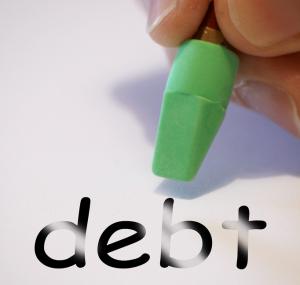Simple Does It: Secured and Unsecured Debts
A while back, we started to give banking and bankruptcy the MomVesting "simple does it" treatment. That is, we started to look at banking and its terms in a pared down, basic light. Today, we continue what we started, this time focusing on secured and unsecured debts. Without further adieu, here is what you'll want to know about these important banking terms.
Secured Debts
In it's simplest definition, a secured debt is one that is associated with or backed by an asset. Probably the most common example of a secured debt is a mortgage; the debt here is the mortgage itself and the asset is the property the mortgage pays for. If you've borrowed money from an institution of some sort (think: a bank) for a tangible thing (think: house or car), that money owed is considered a secured debt.
Why "secured," you might ask? Because if you were to stop paying that debt, the bank or lender could come collect the physical property associated with the owed money. In other words, if one stops making a car payment, eventually the bank will come knocking, wanting something for the money they lent; it's secured in that, in theory, if they can't get the money owed, they'll get something out of the loan, most likely the car for which they lent you the cash.
Unsecured Debts
On the flipside, there's unsecured debts. When you enter into an unsecured-type debt, you're still giving your word that you'll pay what you owe – but that's it. There's usually nothing tangible or physical, like a house or car, associated with the money you're borrowing in an unsecured debt. Credit cards and personal loans are two common types of unsecured debt.
For example, say you take out a loan to take a trip to Hawaii, and after you return to the mainland, tanned and relaxed, you don't make payments on that loan; the bank you got the loan from can't exactly rewind time and take away your vacation. So while you did at one point agree to pay back the debt you took on, once you don't make good on paying back what you owe, there's nothing solid the bank can come take to satisfy what's owed them.
Sometimes financial terms have a ring to them that makes it seem like you need a banking or accounting background to make sense of it all; MomVesting's "Simple Does It" series aims to take the mystery out of these common financial terms. Stay tuned as we bring you more on bankruptcy as well as other financially-related info.
- Login to post comments
-







femmefrugality wrote:
Mon, 01/09/2012 - 16:34 Comment #: 1Love this series! Thanks for the education.
When to File for Personal Bankruptcy wrote:
Wed, 01/11/2012 - 17:02 Comment #: 2[...] get something out of the loan, most likely the car for which they lent you the cash.Source: momvesting.com Tags: Bankruptcy, bankruptcy office, information, personal loan after bankruptcy, unsecured [...]
Secured vs Unsecured Debt in a Chapter 7 Bankruptcy.wmv & wrote:
Tue, 01/17/2012 - 23:58 Comment #: 3[...] Why “secured,” you might ask? Because if you were to stop paying that debt, the bank or lender could come collect the physical property associated with the owed money. In other words, if one stops making a car payment, eventually the bank will come knocking, wanting something for the money they lent; it’s secured in that, in theory, if they can’t get the money owed, they’ll get something out of the loan, most likely the car for which they lent you the cash.Source: momvesting.com [...]
Financial Mistakes: Rolling Unsecured Debt into Your Home Lo wrote:
Tue, 01/31/2012 - 12:15 Comment #: 4[...] few weeks ago, we introduced the terms unsecured and secured credit. Melinda did a great job of defining the terms in her "Simple Does It" series, and now that we have [...]
Liz wrote:
Wed, 03/28/2012 - 03:35 Comment #: 5Choosing between those two options on debts, i would prefer applying on the secured one because if ever I will not be able to pay my loan in the due date they have given me at least the asset I have applied on the loan.